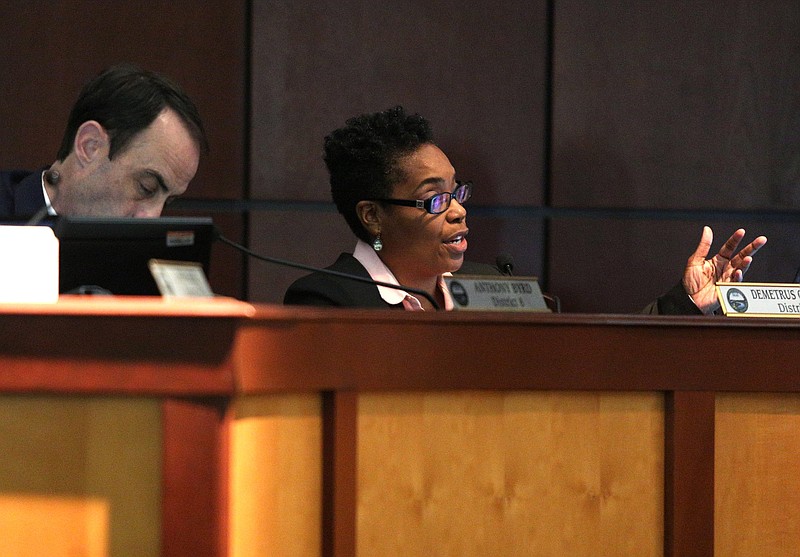We would encourage any Chattanooga City Council members who want to get more involved in the city's budget process to do so - to a point.
Council members made noises about wanting more of a say in the process during Tuesday's strategic planning meeting, and we think that's healthy. But it may come down to a question of how far they want to get into the weeds.
Traditionally, the mayor's staff presents the city's budget to the council in early May, and, after department budget presentations, it's voted up or down in late June. Oh, questions are asked, but it's not as if the administration is sent back to an anteroom and asked to come back with something else.
Council members were angling to see if they had specific power like a line-item veto, where they could select any expenditure - say a mythical $500,000 for continuing education for sign inspectors - and vote it out with five of their nine votes.
"[W]e need to know if we can amend it or vote on part of it while not approving every item in the whole thing," Councilman Darrin Ledford said. "It's like a Christmas present we know that it is coming, but we have to wait and hope we're going to like it."
The governors of 44 of the 50 states, plus the mayor of Washington, D.C., have some form of line-item veto. And three recent U.S. presidents, Ronald Reagan, Bill Clinton and George W. Bush, have sought it for the federal budget.
The Line Item Veto Act of 1996 actually passed the Republican House and Senate and was signed into law by the Democrat Clinton, but the U.S. Supreme Court ruled it unconstitutional because it acted as a unilateral amendment by the president on only parts of statutes authorizing spending, and therefore violated the Presentment Clause of the Constitution.
Bush in 2006 attempted to resurrect a form of the line-item veto, which would have sought congressional approval for something the president zeroed-out. The bill passed the House and the Senate Budget Committee, but it did not pass the full Senate and did not become law.
About Chattanooga's charter, city attorney Phil Noblett told council members it does not address a line-item veto but does give them authority to modify the budget as they can any ordinance with a majority vote.
That makes sense if there is something particularly odious a majority of council members doesn't want to fund.
But we also can imagine a scenario where - not necessarily with this mayor and this council - a council containing a majority of members who have different leanings from the mayor subjects multiple items in the budget to amendments. A budget session, with questions, amendments and votes, might last hours, or even several meetings, depending on the degree of minutiae to which the council members want to take it.
Better, perhaps, if council members were in on the process from the start. That's Councilwoman Demetrus Coonrod's suggestion.
"If we could just be there and be a part of the actual creation of the budget, we wouldn't be having this discussion," she said. "I want to be there so it's not such a surprise and so I can make sure my input is heard before it's put together and it's too late."
Budgets, of course, are put together with the input of many people in many departments, and sometimes across departments. Unless the council member knew the genesis of a specific spending item, it would be difficult to be present at its inclusion in the next budget. And the time involved in shepherding it from creation to budget inclusion might take more time than a council member has.
But, again, we believe seeking information, asking questions, even offering suggestions should be things council members, who have been critical of recent administration financial decisions, do regarding every budget.
Kerry Hayes, chief of staff for Mayor Andy Berke, told the newspaper the administration welcomes such engagement. He said he believes the city has the most engaged and transparent budget process of any city Chattanooga's size.
Indeed, on the city's website, one can find not only the operating and capital budget that was proposed for fiscal 2020 but also a four-year capital budget through 2024 and all of the budgets the administration has submitted since Berke took office in 2013.
That said, we would encourage any or all council members - and citizens - to be as engaged in and curious about Chattanooga's budget as their curiosity, legitimate interest and time allow.
